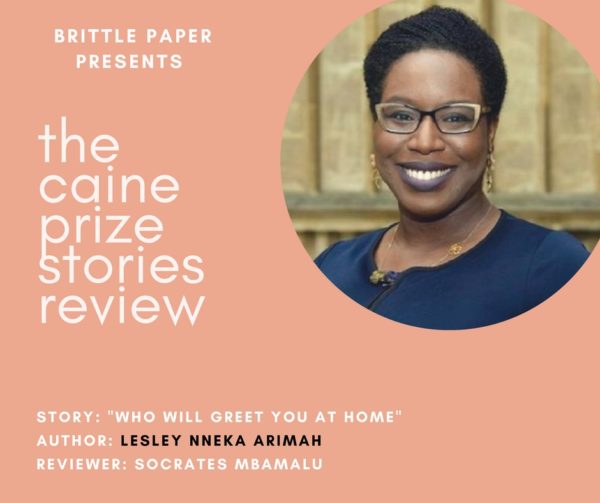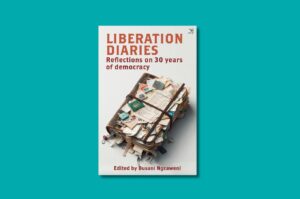Lesley Nneka Arimah was born in the UK and grew up mostly in Nigeria. Her story, “Light,” won the 2015 Commonwealth Short Story Prize for Africa Region and another story, “Glory,” won a 2017 O.Henry Prize. She is the recipient of grants and awards from Commonwealth Writers, AWP, the Elizabeth George Foundation, and the Jerome Foundation. Her collection of stories, What It Means When a Man Falls from the Sky, was published in April. Her novel, The Children of Bones, is forthcoming from Riverhead Books. Following last year’s shortlisting for “What It Means When a Man Falls from the Sky,” Lesley is the second writer to be shortlisted in consecutive years for the Caine Prize.
Her shortlisted story “Who Will Greet You at Home?” is reviewed by Socrates Mbamalu.
*
Class and Creation: Review of Lesley Nneka Arimah’s “Who Will Greet You at Home?”
Lesley Nneka Arimah’s multi-layered, deeply thought-out “Who Will Greet You At Home?” will awake something in you. On one level you’re looking at class, on another, you’re dealing with greed. Arimah creates a whole new society, but one which is recognizable, and thrusts our human desires into it. With its examination of the joy that comes from having a child, what mostly strikes the reader is not the ability of the occupants of this story to create their children but how they are expected to not create children they can’t afford or take care of.
The central character, Ogechi, is a hair saloonist who has been unfortunate in creating her babies. Which makes her a target of ridicule, because every baby she makes never lasts. In the world of this story, you make your baby according to your environment and its demands. The yarn baby Ogechi makes lasts for only a month, and before its demise, she is warned about it. Hers is a house full of nails, not a good place for yarn babies. When she brings her first baby, “a pillowy thing made of tufts,” to her mother, her mother tells her: “This thing will grow fat and useless. You need something with strong limbs that can plow and haul and scrub.”
But Ogechi has aspirations for her child. She wants her child to look soft. She wants an elegant child, one she will pamper and be proud of. She doesn’t see that survival is important in her world, and that whatever child she brings in, the child first has to survive the environment it grows up in. So Ogechi brings her mother another child, this time “a paper child woven from the prettiest wrapping paper.” And her mother “plunged it into the mop bucket until it softened and fell apart.”
Class, here, is tied inextricably to that inevitable human desire to have something good even when we can’t afford it. Ogechi’s search isn’t just to have any child: it’s to have a child that will stand out, on a pedestal above her environment. But certain babies can only be had by certain people. You forge your child according to what you can give it. So when a woman, “stunning, with long natural hair and delicate fingers and skin as smooth as fine chocolate,” comes to the salon with a baby, “porcelain, with a smooth glazed face wearing a precious smirk,” Ogechi is stunned. She would never have believed that such a baby could exist. But then, “only a very wealthy and lucky woman would be able to keep such a delicate thing unbroken for the full year it would take before the child became flesh.”
In the manner of its progression, it is easy to deemphasize that one is reading fantasy fiction, because Arimah’s art constantly reminds you of actual reality, our world and the place of offspring in it. The freedom, in Arimah’s world, to create babies comes with a restriction, an expectation that one would create a baby strong enough to survive all possible terrible experiences for a year.
It is also easy to see only the femaleness of Arimah’s characters. But when one considers the way that childhood is reflected on here, a way in which it cannot be divorced from femaleness, a way in which this childhood wrapped in femaleness is shown to bear the story’s central power, then one sees how justified it is. Arimah brings in childhood activities where girls on the playground carry their dolls, feed them, cradle them, and even beg them to stop crying, all the while observing and relating to each other. This sequence is replicated vividly in Ogechi’s adulthood “when she stepped into the Emporium,” and “the other assistant hairdressers noticed her empty arms and snickered,” because “they’d warned her about the yarn.” When Ogechi finally creates her child out of hair, she realises that it is an expensive child, and she hides it from other characters. It’s not a child she can show off. Their adult world remains that playground on which possessions are examined.
Arimah’s story isn’t one that looses pace. Its flow is strong, such that when reread it still holds gems. She wields in folktale, combined with the traditional call and response that comes with blessing a new child:
Where are you going?
I am going home.
Who will greet you at home?
My mother will greet me.
What will your mother do?
My mother will bless me and my child.
What does Mama need to bless this child?
Mama needs whatever I have.
What do you have?
I have no money.
What do you have?
I have no goods.
What do you have?
I have a full heart.
What does Mama need to bless this child?
Mama needs a full heart.
The story is philosophical. Motherhood is questioned, considered in a different light. What does it mean to be a mother to a child you didn’t create or choose? The words of Kahlil Gibran readily comes to mind: “Your children are not your children.” In a society where you can create your children, what would you create them out of? The role of Woman as creator is rooted here, which leads one to think of the Creator and His creation, and how he made us. Why mud? Why not the bark of a tree? Or porcelain? Is this the most perfect we can possibly be? From clay? The questions human beings would ask God are what Arimah throws back to us. With the people forming babies being women, she teases us with another question: Is God a woman? Had Arimah used men instead, would this story have gone against our association of children with women?
Ogechi ends up destroying her child, her creation that she so loved. A creation she didn’t know how to control. Arimah’s ending of this story is powerful.
When she turned back into the room and lifted the pot, she saw all those pretty, shiny strands transformed into ash. Then she scooped dirt into the pot and added water. This she knew. How to make firm clay—something she was born to do. When the mix was just right, she added a handful of the ashes. Let this child be born in sorrow, she told herself. Let this child live in sorrow. Let this child not grow into a foolish, hopeful girl with joy to barter. Ogechi formed the head, the arms, the legs. She gave it her mother’s face. In the morning, she would fetch leaves to protect it from the rain.
As much as it is about class, this story is also about deeper phenomena like choice and the ability to understand one’s limits. Enmeshed in society, expectations and individual longing, this story, without attempting to, becomes didactic.
**************
About the Author:
 Socrates Mbamalu was born in Nigeria and grew up in Kenya. His nonfiction piece, “Lives of Trailer Drivers,” was published in adda. He is a 2016 Saraba Nonfiction Manuscript prize awardee. His Saraba nonfiction manuscript, The Kenyan Boy, is due for publication as an e-book this year. Twitter: @linsoc.
Socrates Mbamalu was born in Nigeria and grew up in Kenya. His nonfiction piece, “Lives of Trailer Drivers,” was published in adda. He is a 2016 Saraba Nonfiction Manuscript prize awardee. His Saraba nonfiction manuscript, The Kenyan Boy, is due for publication as an e-book this year. Twitter: @linsoc.










COMMENTS -
Reader Interactions